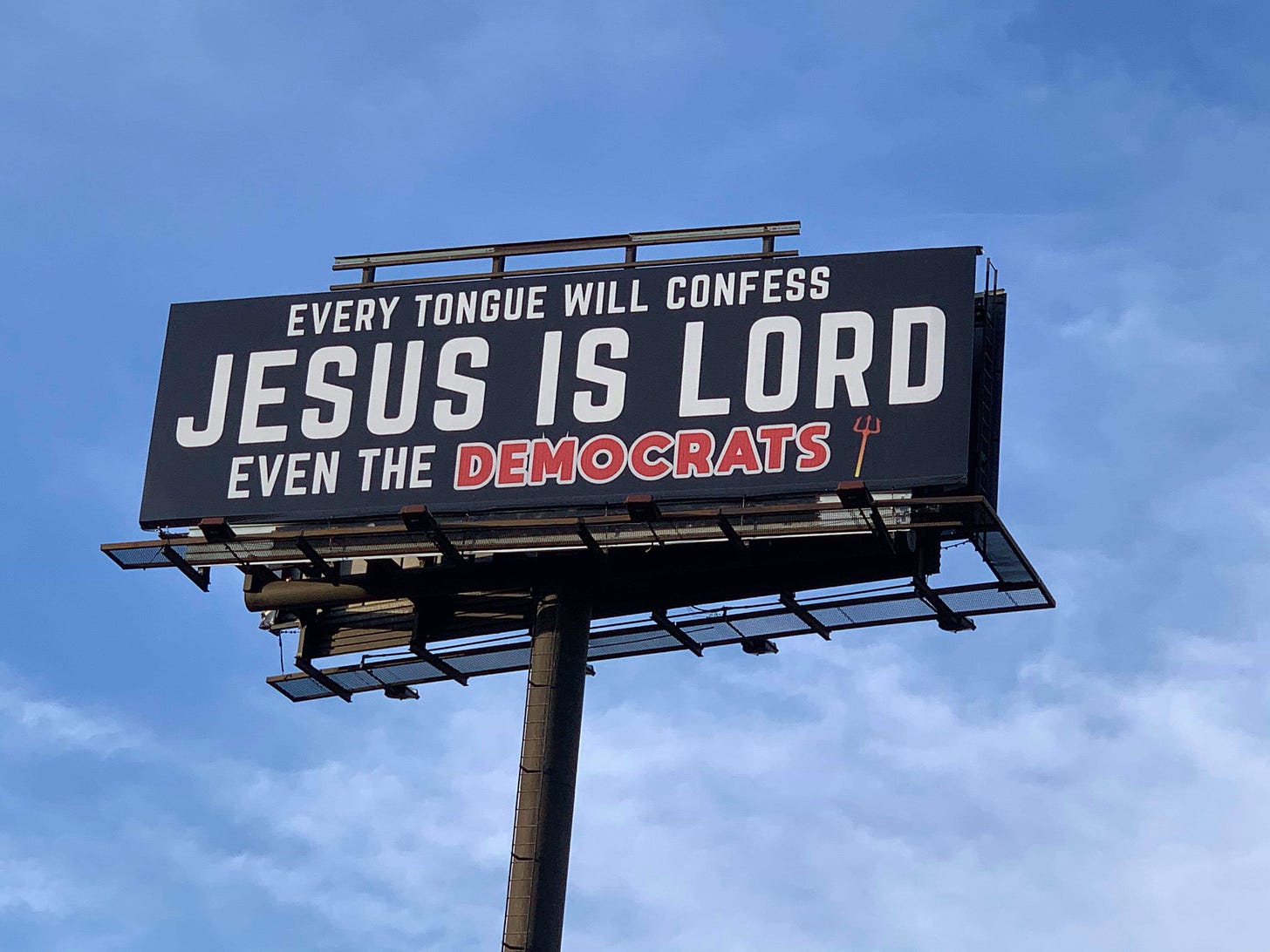States Are Not a Color on the Electoral Map
And we only hurt ourselves when we choose to see it that way

In Embracing Curiosity, I step away from writing about travel to comment on the bigger journey of life, exploring my faith and politics with curiosity and nuance.
We drove past cornfields into the rolling green hills and farmland of southern Indiana and Kentucky. We wove through the mountains of eastern Tennessee and northern Georgia. It had been years since we had done the scenic drive from Indiana to Florida for a family vacation, and as I sat in the passenger seat, I remembered just how beautiful the drive truly is.
I was also reminded just how geographically and ideologically divided our country can be, as we drove from our red state and through three more red states before arriving in a red state that seems to be intent on outdoing all of the other red states combined.
We drove past Trump endorsed political signs from the 2022 election, Trump 2024 signs, and large Confederate flags flying high in the sky. We read billboard after billboard of religious teachings, directives, and pleas for religious conversion, similar to ones that we have seen across the Indiana landscape. Then we came across this particular gem in northern Georgia:

For the record, we never saw anything like that when we traveled toward the east coast last summer.
As left-leaning Christian moderates from Indiana, we felt a strange sense of feeling both at home and unwanted on our journey through the southern United States. The juxtaposition of green pasture and beautiful mountain lakes next to signs of judgement and exclusion verified the beliefs of many who do not live in these states and refuse to travel there: these places are a monolith of conservative values and politics unwelcoming to outsiders.
Except, they aren’t. While we could see that the loudest along the interstate highways were espousing values and political viewpoints we didn’t agree with, we knew that each of these beautiful states are far more diverse than they appear on the surface. They are more than red and blue on an electoral map.
Even as we Americans continue to silo ourselves into like-minded online communities and many choose to move to places where they will be surrounded with people who share their politics and values, the truth remains that we are a pluralistic society full of different races, cultures, ethnicities, religious beliefs, genders, and sexualities. And because most of us don’t display our deepest thoughts on the outside of our bodies, the reality is that we live next to and worship with and work alongside people who may not see the world the same way that we do. Presenting our beliefs and stances in a way that “others” those with whom we disagree hurts us in ways that most don’t see until it is too late.
As someone who loves to travel the United States and has more-often-than-not lived in places where my elected officials don’t reflect my own personal views, this reality pains me. Our country is beautiful and diverse, each region rich in its own history and culture and landscape. And while I believe that federalism has its strengths (because each state is certainly unique in its needs), the more we see each state as a monolithic representative for a political ideology, the more we hurt the pluralistic populations in those states and communities and the impact that the state’s decisions might have on neighboring states and communities. We don’t live in state-shaped vacuums.
For years, Michigan had strict fireworks laws, but I watched my friends and classmates cross the southern border to buy those same illegal fireworks in Indiana, often without consequence. Indiana has not legalized marijuana, but our neighbors to the west and north of us have. We can walk down the street in downtown Indianapolis and smell the Mary Jane on nearly every corner. Illinois gun laws are no match for the lax laws on each of her borders.1 States that border those with limited abortion access have seen an increase in out-of-state patients, while some young women are making that a factor in where they choose to attend college. LGTBQA+ individuals are making plans for how to navigate an increasingly dangerous landscape in the wake of some state laws, some choosing to avoid travel to desirable locations or to visit family, and others choosing to move away from places that they have called home for years. For anyone who has stepped outside this summer, Mother Nature is making it abundantly clear that climate change knows no borders.
And all of this is happening after a global pandemic should have taught us that the health of each state is dependent on the health of its neighbors.
Despite what the voting rolls and our neighbors’ signs say, our nation is far more diverse than most of us even know. Most of us are walking contradictions, all while being told that in order for us to fit into our communities, we need to walk, talk, and act a certain way. And when this is the message that is being clearly sent to local citizens, what is the message being sent to the fellow Americans who visit our little corners of the world? What about the message that is being sent to our international visitors? What do we want our homes to be known for?
Individual states and the people who inhabit those states are not our enemies. We do not need a national divorce. We should not joke about civil war. The people who love their homes and do not want to or cannot leave them behind should not be told that they are getting what they deserve because of the decisions of those in power.
Our trip south was yet another reminder that we need to do better by each other. And while I know that it often feels like hopeless optimism, I continue to believe that we can do better by each other. As citizens, we are never going to completely agree with each other, but we can at the very least see each other as human beings worthy of dignity and respect. And we can demand similar civility from our neighbors even as we imperfectly move forward.2
With 2024 looming in the near distance, this might just be more important than ever.
For a beautiful interview with Barbara Kingsolver about her latest book, which deals with this very issue, check out Ezra Klein’s podcast here or here.
Beth Silvers also did an interview on Pantsuit Politics with a fellow southern woman that helps to highlight some of the above points.
Want to try out paid subscriptions for free?
Refer my Substack to some friends you think might appreciate my work. Get one month for three referrals, three months for eight referrals, and six months for fifteen referrals. You can get referral credit for everything from emailing a post to friends, posting it on your favorite social media, or restacking the post on the Substack app. Once a friend signs up for my Substack, you get referral credit!
Order my new book!
I’ve written a memoir collection of essays based on several of my blog posts from the past seven years. It is available for purchase on Amazon.com.
And if you do purchase, please give it a favorable review on Amazon and Goodreads, or any other book tracking app that you might use.
Please “like” by clicking on the ❤ and share this post with your friends so that others can join me on the journey.
The majority of guns used in crimes in Chicago do not come from the state of Illinois: https://www.nbcchicago.com/news/national-international/chicago-gun-trace-report-2017/27140/
I’m far from perfect when it comes to showing grace to those who I believe are causing harm, but I keep trying to do better.




I had to comment before I finished reading- “at home and unwanted” is a perfect way of saying it. Like, at least for me personally, it would be weird to drive down the highway to go visit my also very liberal parents( and we both live in blue cities) without seeing 5 signs like “Only Jesus Knows The Truth” , “Abortion is Murder” , and the world’s LARGEST American flag. And a few confederate ones. I don’t like it, and I often don’t feel welcome, but if it all disappeared I would wonder what had happened to the darker sides of my home.
This is another really beautiful piece!!